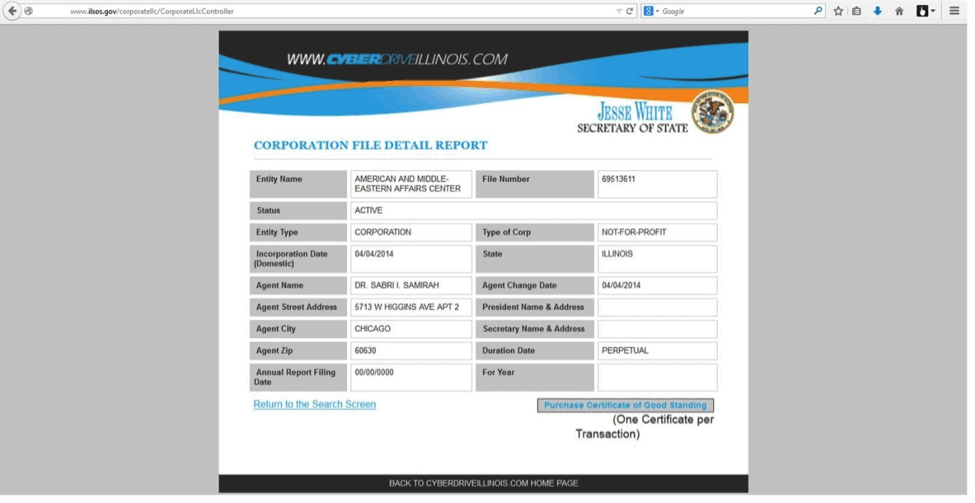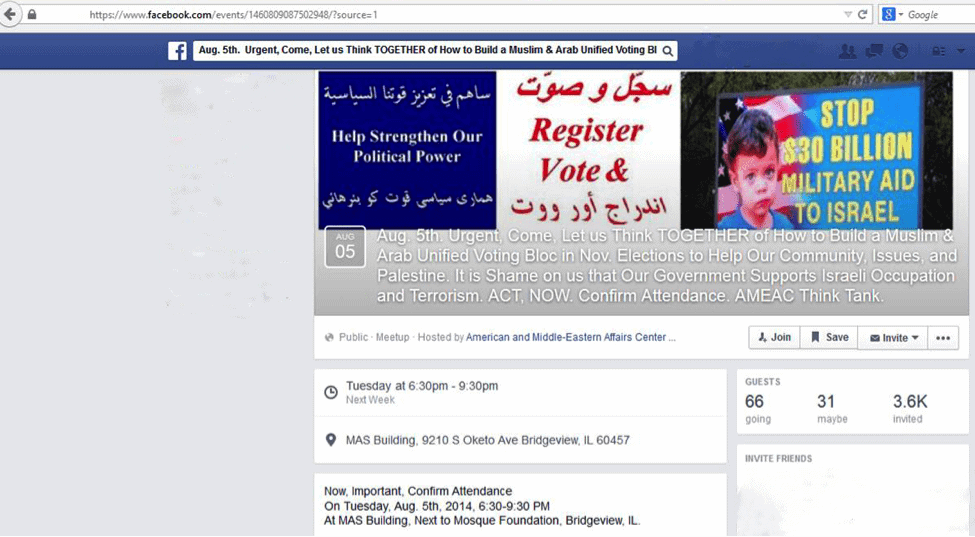Rise of a Brotherhood Organizer: Deportation, Exile, and Return
The expanding role of the USCMO
This piece continues the Center’s focus on the expanding role of the USCMO (United States Council of Muslim Organizations), the first political party in the U.S. to be openly affiliated with the jihadist Muslim Brotherhood. The emergence in 2014 of Sabri Samirah, a Jordanian banned from entry to the U.S. since 2003, but allowed back in eleven years later, as a key leadership figure and political organizer within the USCMO, marks an important stage in the Brotherhood’s “settlement process” as it seeks to expand its influence in American politics. The story of his rise through the ranks of the Muslim Brotherhood and into the U.S. political scene follows.
Prior to his 2003 deportation from the United States, Samirah served as President of the United Muslim Americans Association (UMAA) from 1999 to 2003. Interestingly, and illustrative of the overlapping leadership typical of the Brotherhood’s U.S. network of organizations, the UMAA just happened to share office space with the Islamic Association for Palestine (IAP) in Palos Hills, Illinois. In a letter dated 1 November 2000, Samirah, President of the UMAA, wrote to Rafeeq Jaber, President of the Islamic Association for Palestine and Secretary General of the UMAA Board of Trustees, to tell him that “The IAP, and all of its workers, and supporters are carrying a mission of central importance in the faith, civilization, history, and future of Muslims, Arabs, and Palestinians in America and around the globe.” In addition to his UMAA presidency, Samirah simultaneously also had worked with Jaber and was Chairman of the IAP.
In Samirah’s capacity as a Muslim Brotherhood leader working for IAP and UMAA in the United States, it is essential to understand the connections between IAP and HAMAS and the Muslim Brotherhood nexuses for individuals who still hold positions of leadership today in the U.S.
In 1981, HAMAS operative Mousa Abu Marzook established the Islamic Association for Palestine, in part to create for HAMAS a U.S. organization that would be able to deny any links to HAMAS. On 8 October 1987, the United States Department of State (US DoS) designated HAMAS as a Foreign Terrorist Organization (FTO). The IAP later would be parent to the Council on American Islamic Relations (CAIR), which was incorporated in 1994 by IAP leadership Nihad Awad, Omar Ahmad, and Rafeeq Jaber.
Per the US DoS, Foreign Terrorist Organizations are “designated by the Secretary of State in accordance with section 219 of the Immigration and Nationality Act (INA). FTO designations play a critical role in the fight against terrorism and are an effective means of curtailing support for terrorist activities.”
Under Section 219 of the INA as amended, the Legal Criteria for Designation of a FTO are as follows:
- It must be a foreign organization.
- The organization must engage in terrorist activity, as defined in section 212 (a)(3)(B) of the INA (8 U.S.C. § 1182(a)(3)(B)), or terrorism, as defined in section 140(d)(2) of the Foreign Relations Authorization Act, Fiscal Years 1988 and 1989 (22 U.S.C. § 2656f(d)(2)), or retain the capability and intent to engage in terrorist activity or terrorism.
- The organization’s terrorist activity or terrorism must threaten the security of U.S. nationals or the national security (national defense, foreign relations, or the economic interests) of the United States.
As shown by court documents, the IAP was a prong of the Muslim Brotherhood’s Palestine Committee, until the U.S. government froze IAP’s assets and shut it down in December 2004 on grounds that it was funding terrorism. The IAP was named as one of the Muslim Brotherhood’s twenty-nine likeminded “organizations of our friends” in the May 1991 Muslim Brotherhood document “An Explanatory Memorandum on the General Strategic Goal for the Group in North America.”
Samirah, who had praised Jaber’s work with the IAP, stated that his UMAA organization was “working on politically empowering our Muslim and Arab American community; a front that we believe – in one of its manifestations – will help advancing justice for Palestine and the Palestinian people.” His political abilities were not to be confined only to the Muslim community, but took direct and calculated aim at established U.S. political figures and parties, including the Governor and Illinois General Assembly, including both Democratic and Republican leadership. The screenshot of the following photo collage is from Samirah’s Facebook page. He describes the photos as the following:
“Pics from a Candidates Night 2002, and a pic when signing the Halal Food Act by former Governor of IL. George Ryan. Pics include now Governor Pat Quinn, IL Senate GOP Christine Radogno, back then Chairman of the CIOGC Kareem Irfan, Dr. Jamal Badawi, Shaikh Jamal Said, Dr. Abdel Elsiddig, and Sammer Ghouleh. All of a younger age I will search for more pics of others and the community, and post them for “Memory of Public Life”. — with Abdel Elsiddig and Sammer Ghouleh.”
Before his ban from the United States, Samirah mobilized the UMAA and 450,000 Muslims in Illinois in the successful bipartisan passage of the Halal Food Act, Senate Bill 750. On his Facebook page for the American and Middle-Eastern Affairs Center Think Tank, Samirah states he was “the first Muslim to make a testimony on behalf of the Muslim community and a Muslim issue at the State Senate.” In the following screenshot of a statement from Albawaba News on 20 August 2001, Samirah’s integral leadership role on the Halal Food Act is mentioned.
As shown in the following screenshot of the 92nd General Assembly Status of SB0750, one of the bill’s nine sponsors in the Illinois General Assembly was then-State Senator Barack Obama, a Democrat from Chicago. Obama was added as Chief Cosponsor on 20 March 2001.
On 16 August 2001, less than one month before the fateful events of 11 September 2001, the bill was signed into law by Illinois Republican Governor George Ryan.
On 22 January 2004, after Samirah’s unsuccessful efforts to return to this country after his deportation executed by U.S. Attorney General John Ashcroft, the United Muslim Americans Association (UMAA) was dissolved, according to the website of the Illinois secretary of state, as shown in the following screenshot.
In the absence of Samirah’s leadership due to his deportation, the UMAA website also became defunct. After a decade passed, however, Samirah would call for a gathering of Muslim Brotherhood leadership in August 2014. Samirah planned to host the event at the building of the Muslim American Society (MAS), an overt arm of the Muslim Brotherhood in America, next door to the Mosque Foundation in Bridgeview, Illinois on Tuesday, 5 August 2014.
At this point, after only being in the U.S. for less than six months, Samirah was now both the President of the newly established American and Middle Eastern Affairs Center Think Tank (AMEAC) and CEO of the Development Institute for Consultation & Training, LLC, (DICT). Below is a screenshot from the Illinois Secretary of State’s office with the corporation file detail report for AMEAC with an incorporation date of 04/04/2014.
So, it’s clear that even by that point, he was already well-positioned to launch the next steps intended to advance the introduction of Muslim Brotherhood entities into the U.S. political system.
Samirah stated on the Facebook event page that the August 2014 “historic” meeting agenda “will address the suggestion to establish a new community grassroots organization to be called ‘United Muslim & Arab Americans Association’ (UMAAA).” Due to space limitations, however, the meeting was eventually held at the Universal School.
The following screenshot advertised this upcoming meeting scheduled for 5 August 2014 and is a good illustration of the Brotherhood’s political agenda, given its messages to “Help Strengthen Our Political Power” and “Register & Vote.”
Samirah’s earlier success thirteen years ago in 2001 with the creation of a “Unified Block of Voters” provided him a good working model as he reinitiated this “Unified Voting Block” for the 2014 midterm election cycle. In his letter posted on a Facebook event page from 31 July 2014, Samirah reminded his audience, “Let us not forget the critical role our American policy plays in, blindly, supporting the Israeli occupation and the atrocities they commit with our American tax-money, arms, diplomacy, veto, and alliances around the globe. It is our direct responsibility to change all of that, effectively and strategically; through the building of a solid influence over elected officials, elections and policy-making.”
The following screenshot from his Facebook page for AMEAC shows questions provided in advance to prepare those from the community who would attend this meeting.
On Tuesday, 5 August 2014, just over 70 individuals (including more than one dozen women and even one school age child) from the Muslim and Arab communities were in attendance for a presentation given by Samirah. The following screenshots are from the Facebook page for Samirah’s think tank AMEAC.
Those individuals who gathered for a 2 ½ hour program at the Universal School that evening comprised primarily activists and community leaders from the Chicago metropolitan area and Milwaukee, Wisconsin. Distinguished political guests included Moon Khan (Republican York Township Trustee, and President, Asian-American Caucus of Dupage County, who was also a past chairman for the Islamic Society of North America’s National Convention’s Media Relations Committee) and Nasir Jahangir (2nd vice Chair, Democrat Party of Dupage County).
The initial meeting was an airing of issues considered important to the Muslim community with suggestions for how to solve perceived obstacles that prevented their community from gaining full political empowerment in U.S. society. There was additional talk of stopping Congress from funding Israel, and that Islam/Shariah should be rightfully recognized as a legitimate religion in all of the U.S. The general direction of the discussion as led by Samirah focused on mastery of the operational mechanics of the political process in the U.S. and how to advance Muslim political objectives.
Samirah took advice from individuals about who should be appointed as activists, advisors, community leaders, and subject matter experts to help him with AMEAC’s work in the Muslim community and the development of his UMAA group. At the conclusion of the event led by Samirah, a follow up meeting was set to determine what could be accomplished with a more specific action plan. The stage was set for the lead-up to the November 2014 election.
- Military Starship: How SpaceX Is About to Make America Globally Dominant - March 4, 2025
- The Cautionary Tale of Zheng He - December 4, 2024
- Frank Gaffney departs CSP after 36 years - September 27, 2024










